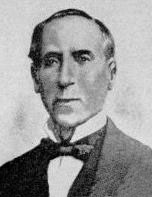James Spriggs Payne
| James Spriggs Payne | |
|---|---|
 |
|
| 4th President of Liberia | |
|
In office January 6, 1868 – January 3, 1870 |
|
| Vice President | Joseph Gibson |
| Preceded by | Daniel Bashiel Warner |
| Succeeded by | Edward James Roye |
| 8th President of Liberia | |
|
In office January 3, 1876 – January 7, 1878 |
|
| Vice President | Charles Harmon |
| Preceded by | Joseph Jenkins Roberts |
| Succeeded by | Anthony W. Gardiner |
| Personal details | |
| Born |
December 19, 1819 Richmond, Virginia , United States |
| Died | January 31, 1882 (aged 62) Monrovia, Liberia |
| Political party | Republican |
| Religion | Methodism |
James Spriggs Payne (December 19, 1819 – January 31, 1882) served as the fourth and eighth President of Liberia, from 1868 to 1870 and from 1876 to 1878. He was the last President to belong to Liberia's Republican Party.
Payne was born in Richmond, Virginia, in 1819 to former slaves who were each of mixed race, of European and African ancestry. Payne grew up in a highly religious Methodist family and was a devout Christian. His father, David M. Payne, was a Methodist minister and was ordained as a deacon by the Virginia Conference in 1824. Payne was very fair; he was said to be of seven-eighths European-American ancestry, or one-eighth African. When Payne was ten years old, his family emigrated to Liberia through sponsorship by the American Colonization Society on the ship Harriet. On the same ship was Joseph Jenkins Roberts, Liberia's future first president.
Aside from religion, the young Payne showed interest in politics and economics. He later became a successful writer in these areas. As an adult, he was appointed by the Liberian government to work to complete the severance of Liberia's ties to the American Colonization Society.
Payne was elected as the fourth president in 1868 and served a two-year term. During his presidency, he worked to end the slave trade that still took place along Liberia's coast. Other reports, such as History of Liberia and Joseph Jenkins Roberts say: “The slave trade from Liberian ports was ended by the British Navy in the 1850s.” Payne improved government relations with the native communities and peoples, whom he believed the newer settlers and politicians had for the most part ignored.
...
Wikipedia
